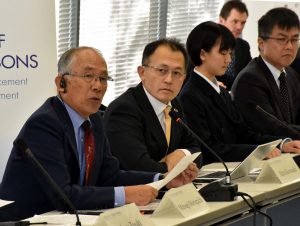Nagasaki citizens convey views on nuclear weapons at Group of Eminent Persons Conference
Nov. 16, 2018
by Kyosuke Mizukawa, Staff Writer
On November 15, as part of the program of the Group of Eminent Persons Conference, 12 local citizens in Nagasaki, including an A-bomb survivor and a high school student, took part in a dialogue with the participants of the conference and officials from Japan’s foreign ministry. The citizens called for realizing the elimination of nuclear weapons as soon as possible by taking advantage of the Treaty on the Prohibition of Nuclear Weapons, which completely bans nuclear arms.
Mitsugi Moriguchi, 82, the secretary general of the Nagasaki Atomic Bomb Testimonial Society, was eight years old when he experienced the atomic bombing of that city. He called on the Japanese government to advocate the treaty, saying, “Japan’s role as a mediator doesn’t mean taking a wait-and-see approach between the nuclear powers and the non-nuclear nations.” Sawa Yamanishi, 17, a second-year student from Nagasaki Prefectural Isahaya High School and a High School Student Peace Ambassador, also shared her hope for nuclear abolition. She said, “As long as nuclear weapons exist, there will always be the possibility that these weapons will be used.”
With the conference participants having discussed the idea of whether or not nuclear weapons could be used, in line with international law, under extreme conditions of self-defense, Akira Kawasaki, 49, a member of the international steering committee of the International Campaign to Abolish Nuclear Weapons (ICAN), a non-governmental organization (NGO), stressed that, in light of the A-bomb survivors’ experiences, the use of nuclear weapons can never be permitted. Mr. Kawasaki warned about the risk of relying on nuclear deterrence for a nation’s security.
A participant from the United States, George Perkovich, the Vice President for Studies at the Carnegie Endowment for International Peace, said that many nations believe their security cannot be preserved only through conventional weapons. He added that it was possible to consider circumstances where the use of nuclear weapons would not violate international humanitarian law (which bans an indiscriminate attack), such as an underwater attack with nuclear-tipped torpedoes against submarines. Tariq Rauf, a participant from Canada and the former Head of Verification and Security Policy Coordination at the IAEA, countered that an attack of this nature would violate human ethics even if it were not legally prohibited. Mr. Rauf also said that such a view was irresponsible and dangerous.
(Originally published on November 16, 2018)
On November 15, as part of the program of the Group of Eminent Persons Conference, 12 local citizens in Nagasaki, including an A-bomb survivor and a high school student, took part in a dialogue with the participants of the conference and officials from Japan’s foreign ministry. The citizens called for realizing the elimination of nuclear weapons as soon as possible by taking advantage of the Treaty on the Prohibition of Nuclear Weapons, which completely bans nuclear arms.
Mitsugi Moriguchi, 82, the secretary general of the Nagasaki Atomic Bomb Testimonial Society, was eight years old when he experienced the atomic bombing of that city. He called on the Japanese government to advocate the treaty, saying, “Japan’s role as a mediator doesn’t mean taking a wait-and-see approach between the nuclear powers and the non-nuclear nations.” Sawa Yamanishi, 17, a second-year student from Nagasaki Prefectural Isahaya High School and a High School Student Peace Ambassador, also shared her hope for nuclear abolition. She said, “As long as nuclear weapons exist, there will always be the possibility that these weapons will be used.”
With the conference participants having discussed the idea of whether or not nuclear weapons could be used, in line with international law, under extreme conditions of self-defense, Akira Kawasaki, 49, a member of the international steering committee of the International Campaign to Abolish Nuclear Weapons (ICAN), a non-governmental organization (NGO), stressed that, in light of the A-bomb survivors’ experiences, the use of nuclear weapons can never be permitted. Mr. Kawasaki warned about the risk of relying on nuclear deterrence for a nation’s security.
A participant from the United States, George Perkovich, the Vice President for Studies at the Carnegie Endowment for International Peace, said that many nations believe their security cannot be preserved only through conventional weapons. He added that it was possible to consider circumstances where the use of nuclear weapons would not violate international humanitarian law (which bans an indiscriminate attack), such as an underwater attack with nuclear-tipped torpedoes against submarines. Tariq Rauf, a participant from Canada and the former Head of Verification and Security Policy Coordination at the IAEA, countered that an attack of this nature would violate human ethics even if it were not legally prohibited. Mr. Rauf also said that such a view was irresponsible and dangerous.
(Originally published on November 16, 2018)








